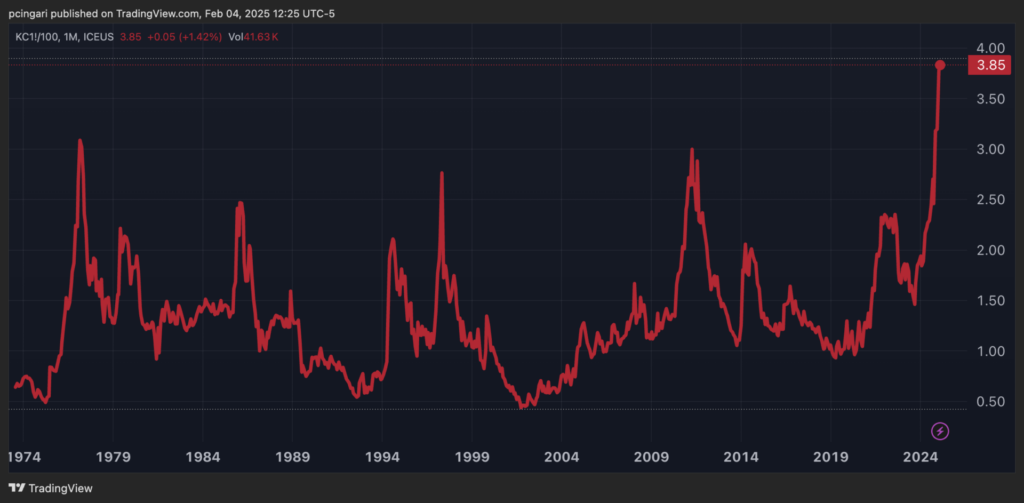Zinger Key Points
- Coffee prices hit record highs, surging 100% year-over-year and surpassing 1977 levels, sparking fears of high inflation on coffee cups.
- Arabica coffee futures have rallied for 10 straight sessions, with prices at $3.90/lb, making coffee 2025’s top-performing asset.
- Our government trade tracker caught Pelosi’s 169% AI winner. Discover how to track all 535 Congress member stock trades today.
Americans' coffee addiction is about to get a lot more expensive. With 66% of the population drinking coffee daily and an average intake of 2-3 cups per person, the U.S. is the world’s largest coffee market.
Yet, a fresh jolt of bad news is hitting consumers: coffee prices have surged to fresh records, surpassing levels last seen in 1977, and the rally isn’t slowing down.
Coffee has become the best-performing asset of 2025 so far, soaring 20% in just over a month—outpacing every major stock market index and even Bitcoin BTC/USD.
Arabica coffee futures have now climbed for 10 consecutive sessions through Feb. 4, nearing what could be the longest winning streak ever recorded.
On Tuesday, Arabica coffee traded at $3.90 per pound, marking a staggering 100% increase from a year ago. This surge threatens to percolate through the entire supply chain, raising concerns that consumers could soon face skyrocketing inflation on their daily coffee cups.
With demand unwavering and supply chains under pressure, is a $10 cup of coffee on the horizon? And which companies can benefit from it?
Chart: Coffee Price Skyrockets To Record Highs

Coffee Retail Prices Set To Surge Amid Market Disruption
“I have a prediction about coffee, and I wish I weren’t so confident about that,” said Bloomberg’s Javier Blas in a video published on X Monday.
His outlook? Double-digit price hikes for a cup of coffee in the coming months. The main culprit behind the surge is a severe production shortfall in Brazil and Vietnam, the world's top two coffee producers, where bad weather and climate change have damaged crops.
In its first estimate for the 2025/26 season, Brazil's government crop forecasting agency projected a 4.4% year-over-year decline in coffee output, hitting a three-year low of 51.81 million bags.
Meanwhile, Blas warns that global stockpiles could fall to their second-lowest level in 65 years as supply struggles to keep pace with demand.
“Global stockpiles [of coffee] could fall at the second-lowest level in 65 years,” Blas said.
According to Blas, the coffee supply chain has been in deficit for four consecutive years, with demand exceeding supply by 15 to 20 million bags annually, leading to a sharp drain in reserves.
Adding to the crisis are geopolitical tensions tied to Donald Trump's trade tariffs, which have rattled markets.
Colombia, the world's third-largest coffee producer, faces potential U.S. tariffs amid disputes over illegal migration, further tightening an already stretched coffee market. "Just the threat of tariffs is enough to scare the market," Blas stated.
Bottom line, the expert forecasts a 20-25% increase in retail coffee prices within the next few months—making that morning cup significantly more expensive.
Higher Coffee Prices: Are You a Price Taker or a Price Setter?
The skyrocketing cost of coffee is set to reshape the industry, testing which companies can pass rising costs onto consumers and which will see their margins squeezed.
As coffee futures surge to record highs, businesses from coffee chains to fast food giants are under pressure to adjust pricing strategies—or risk profitability declines.
Starbucks Corp. SBUX has recently been a standout performer, with shares rallying 27% since the December 2024 lows, reaching levels last seen in May 2023.
“[Starbucks] has introduced a new pricing architecture,” Goldman Sachs analyst Christine Cho said after the world’s largest coffee chain published quarterly results last week.
This might potentially indicate investor confidence in Starbucks’ ability to raise prices without losing customers. With a loyal customer base and a premium brand, Starbucks might be positioned as a price setter in the coffee market.
McDonald's Corp. MCD could struggle to pass on higher coffee costs.
While not exclusively a coffee chain, McCafé is a significant revenue driver. Yet, McDonald’s core customer base is highly price-sensitive. Unlike Starbucks, McDonald’s might have less flexibility to raise coffee prices without impacting sales. Investors seem to agree—MCD shares have fallen nearly 10% since October 2024.
Restaurant Brands International QSR, the owner of Tim Hortons, one of the largest coffee chains in Canada, is another company feeling the heat. With shares down 25% since March 2024, the stock’s performance suggests concerns over its ability to manage higher input costs. Investors will be watching closely when QSR reports fourth-quarter earnings on Feb. 12, 2025.
Read now:
Photo: il21/Shutterstock.com
© 2025 Benzinga.com. Benzinga does not provide investment advice. All rights reserved.
Trade confidently with insights and alerts from analyst ratings, free reports and breaking news that affects the stocks you care about.